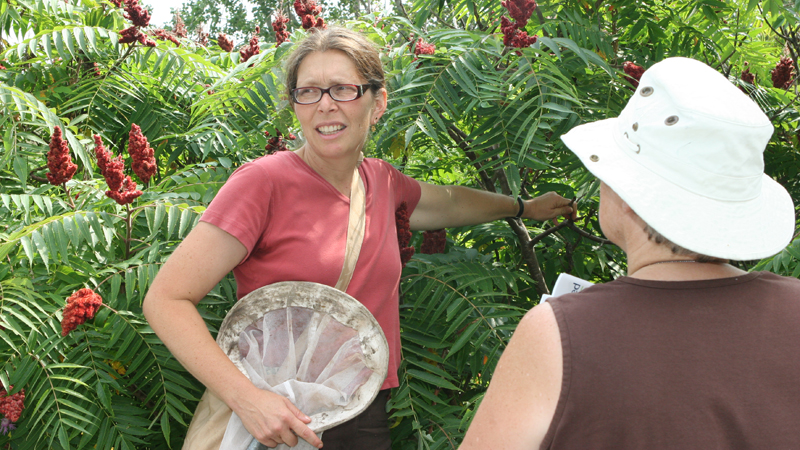
Miriam Richards leads a group down a Glenridge Quarry trail.
Miriam Richards used to think insects were boring.
The associate professor of Biological Sciences changed her mind greatly during her formative university years, so much so that she now spends a good portion of every day thinking about and researching them.
In particular, she researches and talks about the social and ecological attributes of bees. Her research team’s work came into the spotlight recently with the release of the Niagara Community Observatory’s fourth policy brief, “Niagara’s Natural Park: The Restoration of the Glenridge Quarry into a Naturalization Site,” which outlines the restoration of a former landfill site near Brock’s St. Catharines campus.
Richards outlined the return of flora and fauna after the naturalization by discussing the inventory of bee species found at the site since 2003. While not quite up to the usual standards of other similar parks with 150-160 species, her research team found 125 different species of bee at this site, demonstrating its ability to exist as a natural oasis in an urban environment. The bees will assist in pollination of fruit and flower plants, providing a vital service to the environment at a time when bee populations in different parts of the country and the world seem to be declining.
Richards noted during her talk at the naturalization site that there are places in China where human workers need to literally paint the pollen on the fruit trees by hand, since the pollution has driven away the pollinating bees.
To keep up with similar work being done across the country, Richards is part of the CANPOLIN initiative (Canadian Pollination Initiative), a five-year Natural Sciences and Engineering Research Council of Canada (NSERC) Strategic Network that will address the growing problem of pollinator decline in agricultural and natural ecosystems in Canada.
Researchers at 26 universities across the country are working with government agencies, NGO’s and industry to deliver critical insights and sustainable solutions to the pollination problem. To make sure the researchers are all approaching their work the same way, CANPOLIN is working on a standardized way of identifying and counting the various species. Canada has some 900 documented species to date, while there are approximately 19,000 bee species worldwide.
For those feeling the need to reach for an epipen, Richards is quick to note that bees only sting if provoked, and there are many, many species without the ability to sting.
To see the policy brief, visit the Niagara Community Observatory.
Links:
• Miriam Richards faculty page
• Past research profiles









